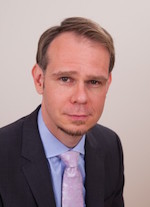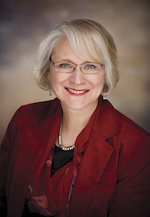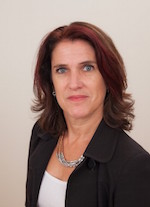Research communications experts partner with Morgridge Institute
Intuition tells us that the more factual information one gathers on a controversial topic, the more likely one will reach the “correct” conclusion.
But when it comes to controversial science — genetically modified foods, biofuels, and climate change, to name a few — the most informed people on the topics frequently have the most polarized views about their value or risk.
Dietram Scheufele, a University of Wisconsin–Madison professor of life sciences communication, studies the effects of this kind of “motivated reasoning,” in which identical scientific facts can lead people to vastly different conclusions.

Dietram Scheufele
It’s an important principle, he says, in how science stakeholders should communicate complex research to the public.
Scheufele and colleagues in the Department of Life Sciences Communication (LSC) are partnering with the Morgridge Institute for Research to take a deeper look at what works — and why — in engaging the public on science. Morgridge provides a unique proving ground for the topic: In partnership with the Wisconsin Alumni Research Foundation, science outreach programs bring more than 30,000 participants to the Discovery Building each year.
The team will develop research programs that measure the outcomes of different outreach activities, assess the effectiveness of different messaging techniques, and are able to design and test new strategies to engage people on hot-button research areas.

Kathryn VandenBosch
The new partnership reflects the commitment to science outreach and communications by the College of Agricultural and Life Sciences, which includes LSC. Dean Kathryn VandenBosch chairs the annual Wisconsin Science Festival steering committee and has seen firsthand the impact that public engagement in science can have on the community.

Dominique Brossard
As part of the initiative, Scheufele, VandenBosch and LSC Department Chair Dominique Brossard have been named Morgridge Institute affiliates.
“This is not the science we learned about in school,” Scheufele says of the modern “nano-bio-info-cogno” landscape. “The challenge has become more complex as the science we are dealing with has developed faster than ever before. A lot of the things coming out of modern universities are fast moving, very complex and raise ethical, legal and political issues at the same time.”
Scheufele says that studies show the public tends to trust that scientists are doing meaningful research, but convey more uneasiness about the implications of the science. “They have questions about what the research means for my life, what it means for my religious views, or what I think as a society we should or should not be doing.”
The Morgridge project, Scheufele says, will look at ways to bring scientific information together with the moral, ethical and political questions it generates. The Morgridge Institute and the unique role of the Discovery Building can be a “catalyst” and a “convener of conversation” about where science is headed and the potential pitfalls.
“In many ways, the Discovery Building has both a physical and virtual footprint,” he says. “It stands for an idea, but also has a lot of social capital in the community.” Beyond formal outreach programs, the building attracts an estimated 100,000 total visitors annually, presenting a unique opportunity to reach diverse points of view.
Like most research universities, UW–Madison has a highly established and far-reaching science outreach enterprise. But there is far less known about what works and why. Scheufele says the Morgridge initiative could help fill a gap nationally in research about the effectiveness of different programs.
“Modern science is about wicked big issues — issues without clear answers that society needs to tackle. We’ll never have a perfect answer, only a best possible answer.”
Dietram Scheufele
Broader public engagement in science is crucial because “we are relying on science and technology for almost everything in this country,” he says.
And they frequently do not produce clean, clear-cut outcomes. Regardless of where one stands on the environmental impact of fracking, Scheufele says, the practice has led to lower oil prices. And regardless of views on the ethics of military drones, their use does increase the safety of American troops. People opposing GMO foods will need to acknowledge that they will likely reduce starvation in a rapidly growing global population.
“Modern science is about wicked big issues — issues without clear answers that society needs to tackle,” he says. “We’ll never have a perfect answer, only a best possible answer.”
Scheufele has forged a national reputation on topics related to science, social media and public engagement. An influential 2012 project with UW–Madison colleagues explored the “nasty effect” from online news comment sections, showing how the extreme nature of online commentary can color perceptions of the original story. Scheufele and colleagues also recently reported on the value of social media to scientists, showing that researchers who share results on Twitter have far more interaction with media and the public.
Subscribe to Wisconsin Ideas
Want more stories of the Wisconsin Idea in action? Sign-up for our monthly e-newsletter highlighting how Badgers are taking their education and research beyond the boundaries of the classroom to improve lives.




